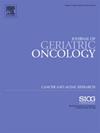Living with and beyond cancer: What older adults tell us about healthy aging
IF 3
3区 医学
Q3 GERIATRICS & GERONTOLOGY
引用次数: 0
Abstract
Introduction
Healthy aging is a process that allows for optimal functional ability and wellbeing, but little is known about older adults' experiences living with and beyond cancer (also called survivorship). The purpose of this study was to explore the experiences and perceptions of healthy aging among older adults living with and beyond cancer.
Materials and Methods
Community-dwelling older adults diagnosed with cancer at age ≥ 65 were recruited to participate in a series of in-depth semi-structured interviews. We used interpretive description and patient-oriented research methods. Data were thematically analyzed.
Results
A total of 20 older adults living with and beyond cancer (mean age 74) in British Columbia, Canada, participated. Coping with cancer and age-related changes in older age was important for healthy aging and quality of life. Older adults coped by adapting to maintain their health and function, accepting and rejecting barriers, and defying ageist norms about cancer in older age. Participants reported discrepancies between their own priorities for healthy aging and their perceptions of healthcare providers' priorities for them. For example, older adults identified a lack of attention to quality of life and minimal integration of psychosocial supports in cancer treatment and survivorship care. Our findings also address the nuances of how cancer influences health behaviours in the context of pursuing healthy aging.
Discussion
Understanding the experiences and perceptions of healthy aging among older adults living with and beyond cancer is critical to promoting health for this growing population. Our findings highlight the need for individualized care and the importance of quality of life for older adults living with and beyond cancer. This work can inform interventions to support healthy aging.
与癌症共存并超越癌症:老年人告诉我们的健康老龄化
健康老龄化是一个允许最佳功能能力和健康的过程,但对于老年人与癌症共存和超越癌症的经历(也称为生存)知之甚少。本研究的目的是探讨老年人与癌症生活和健康老龄化的经验和看法。材料和方法招募≥65岁诊断为癌症的社区老年人参加一系列深入的半结构化访谈。我们采用解释性描述和以患者为导向的研究方法。对数据进行主题分析。结果在加拿大不列颠哥伦比亚省共有20名患有癌症的老年人(平均年龄74岁)参与了研究。应对老年癌症和与年龄相关的变化对健康老龄化和生活质量很重要。老年人通过适应来维持他们的健康和功能,接受和拒绝障碍,并无视有关老年癌症的年龄歧视规范。参与者报告了他们自己对健康老龄化的优先事项与他们对医疗保健提供者对他们的优先事项的看法之间的差异。例如,老年人发现在癌症治疗和生存护理中缺乏对生活质量的关注,社会心理支持的整合也很少。我们的研究结果还解决了癌症在追求健康老龄化的背景下如何影响健康行为的细微差别。了解患有癌症的老年人对健康老龄化的经历和看法,对于促进这一不断增长的人口的健康至关重要。我们的研究结果强调了个体化护理的必要性,以及对患有癌症和癌症后的老年人生活质量的重要性。这项工作可以为支持健康老龄化的干预措施提供信息。
本文章由计算机程序翻译,如有差异,请以英文原文为准。
求助全文
约1分钟内获得全文
求助全文
来源期刊

Journal of geriatric oncology
ONCOLOGY-GERIATRICS & GERONTOLOGY
CiteScore
5.30
自引率
10.00%
发文量
379
审稿时长
80 days
期刊介绍:
The Journal of Geriatric Oncology is an international, multidisciplinary journal which is focused on advancing research in the treatment and survivorship issues of older adults with cancer, as well as literature relevant to education and policy development in geriatric oncology.
The journal welcomes the submission of manuscripts in the following categories:
• Original research articles
• Review articles
• Clinical trials
• Education and training articles
• Short communications
• Perspectives
• Meeting reports
• Letters to the Editor.
 求助内容:
求助内容: 应助结果提醒方式:
应助结果提醒方式:


